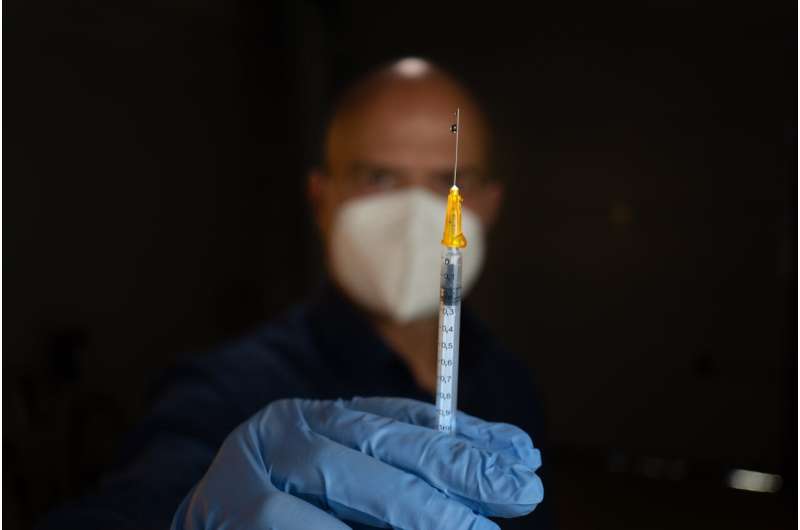

Decision-makers must deploy targeted public health messaging to tackle COVID-19 vaccine hesitancy among groups where uptake is particularly low, according to new University of Stirling research.
Experts from the University’s Institute for Social Marketing and Health (ISMH) and the National Centre for Social Research (NatCen) led a survey of almost 5,000 adults in the UK to explore vaccine intentions and the implications for communications and targeted support.
The study—funded by the Economic and Social Research Council, conducted via NatCen’s probability-based panel and published in BMJ Open—found that vaccine hesitancy was a particular issue in non-white British ethnic groups, in younger adults, and among those with lower education, greater financial hardship and those who believe that they have already had the virus.
While UK acceptance has been generally high, there have been concerns about uptake among subpopulations and in other parts of the world. The research findings will help to understand and inform approaches to addressing vaccine hesitancy in low-uptake groups, as vaccine programs continue to progress worldwide.
Martine Stead, Deputy Director of ISMH, led the major study which also involved University College London Great Ormond Street Institute for Child Health and St George’s University of London Population Health Research Institute.
Ms Stead said: “Our research provides a new and important insight into vaccine hesitancy—and this is a vital issue because it can threaten comprehensive vaccination in populations.
“We considered vaccine intentions of almost 5,000 UK adults in the early stages of the vaccine roll-out and explored important issues, such as the factors behind acceptance and trust in information sources. The results indicate that targeted engagement is required to address vaccine hesitancy in non-white British ethnic groups, in younger adults, and among those with lower education, greater financial hardship and unconfirmed past infection.
“Healthcare professionals and scientific advisors should play a central role in communications—as they are regarded as the most trusted—and tailored messaging is needed for hesitant groups. Work is also needed to rebuild trust in government information.”
The survey of 4,978 adults was conducted in January and February 2021—just weeks after the vaccine roll-out got under way in December 2020. It gave researchers a unique insight into the thoughts and intentions of those faced with active, rather than hypothetical, decisions on vaccination. The team considered participants’ sociodemographic characteristics—including age gender, ethnicity, education and financial status, vaccine acceptance, COVID-19 status, trust in vaccination information sources perceptions of vaccination priority groups, and perceptions of importance of second dose.
At the time of the study, just 14 percent of participants had been offered the vaccine—with 92% of those having already accepted or stating that they intended to accept. Four percent had refused or intended to refuse. Among those who had not yet been offered the vaccine, 82% intended to accept, 11% were uncertain and 7% indicated that they would refuse. Overall—combining both decisions and intentions—the acceptance level was 83%, with 10% uncertain and 7% refusing.
Factors behind acceptance
While 87% of white British participants indicated vaccine acceptance, this fell significantly in other ethnic groups, with 58% acceptance in black / black British groups, 61% mixed / multiple ethnic groups and 61% among Asian / Asian British groups.
The researchers found that the likelihood of acceptance also increased with age—for example, those aged 50–59 were more likely than the 18–49 age group to indicate acceptance, while people who thought they “probably” or “definitely” had already contracted COVID-19 were less likely to indicate acceptance.
Ms Stead explained: “A novel finding of our study was that there was lower vaccine acceptance among those with unconfirmed, but suspected, COVID-19. This suggests that prior infection is presumed to provide immunity, or that recovery fosters a perception of decreased severity. However, further research is required to explore why those who suspect they’ve had COVID-19, but not had it confirmed by a test, are less likely to accept the vaccine.”
Participants educated to at least degree level were three times as likely, and those educated to A-level or equivalent were nearly twice as likely, to indicate acceptance, compared to those without qualifications.
Compared with those who described their financial situation as “living comfortably,” people “finding it very difficult” were much less likely to accept the vaccine.
Trust in information sources
The study found that the top three trusted information sources were the NHS; doctors, nurses, and other healthcare professionals; and scientific and medical advisers. Just 44% trusted the UK Government “completely / a great deal,” with the three least trusted sources reported as celebrities and social media influencers; social media; and faith or community leaders. Sixty-one percent indicated that they had very little or no trust in the media.
“Difference in trust varied by sociodemographic factors,” Ms Stead explained. Compared with White British participants, other ethnicities had lower trust in healthcare and scientific sources. Although trust in faith/community leaders was low, it was higher in Asian/Asian British and Black/Black British participants, suggesting a role for these leaders.
“Those with lower educational attainment or financial hardship had lower trust in healthcare and scientific sources, and those with no qualifications had higher trust in media and family and friends.
“This suggests a mix of information sources is required for these groups—and mainstream media may have a role to play, despite lower trust.”
Prioritization
When asked who should be prioritized for the COVID-19 vaccine, nine in 10 participants rated healthcare professionals as the highest priority. More than 70% indicated that those with serious health conditions and heightened vulnerability to COVID-19; care home workers and residents; and over 80s should be among the first to be vaccinated. More than a third agreed that social care workers, schoolteachers and those directly working with the public should also be in the first groups to be vaccinated.
Source: Read Full Article